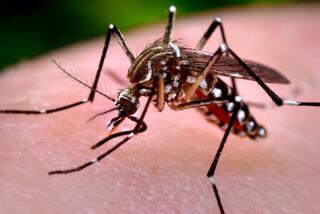More on why the U.S. was unprepared for Ebola
- Share via
As we reported Sunday, Sen. John McCain (R-Ariz.) engaged in some pointless and uninformed ruminations about the government’s response to the Ebola virus.
But Ebola is one of those public events that expands exponentially in its consequences, public attention, news coverage and political opportunism -- all of it happening simultaneously -- so we’ve learned more since McCain’s TV appearance about the factors in the American response. Here they are, in a nutshell: political posturing and budget cuts.
The chart above, from Scientific American, shows the budget trend line of just one element of U.S. infectious disease preparedness. It shows that funding for a Centers for Disease Control program to help states and municipalities with public health emergency preparedness funding collapsed from $1.1 billion in 2006 to $585 million last year.
That’s just one CDC program. Scientific American reports:
“NIH’s budget was reduced by $446 million from 2010 to 2014, and subjected to inappropriate politically motivated interference in its decision making. The CDC’s discretionary funding was cut by $585 million during this same period. Shockingly, annual funding for the CDC’s public health preparedness and response efforts were $1 billion lower for 2013 fiscal year than for 2002. These funding decreases have resulted in more than 45,700 job losses at state and local health departments since 2008.”
The cuts in public health spending are part and parcel of Congress’ post-2008 budget stinginess, in which cutting expenditures somewhere -- anywhere -- takes a front seat to figuring out the places where spending is crucial.
Ebola is not the only infectious disease threat that will unnecessarily challenge the public health system as a result of this penny-wise and just plain foolish budgeting -- in fact, not nearly the most serious threat. The cuts came during a period in which vaccine-preventable diseases such as measles and whooping cough were back on the rise, thanks to the pure brainlessness of the anti-vaccine movement and the lack of public resources to counteract it.
A related problem is the casual approach of American hospitals and public health authorities to emergency preparedness. On the heels of this weekend’s report that a nurse treating Ebola patient Thomas Duncan contracted the disease despite wearing protective gear, many experts have pointed out that using protective gear is not enough -- you have to be painstakingly trained in how to wear it and, especially, how to take it off; it’s not uncommon for infections to occur in the process of doffing the gear.
The French medical service Doctors Without Borders, which functions throughout the Third World, has developed painstaking procedures allowing its staff to treat Ebola patients, and says that nine of its staff members have died of the disease. The organization is expert at managing in trying conditions; American professionals are still learning best practices. As science writer David Dobbs observes, that goes for quarantine and cleanup procedures, too.
The NIH and CDC have done an admirable job of trying to keep national alarm about Ebola properly tamped down thus far, though they can’t stop political stupidity from spreading faster than the virus. Just this weekend, Louisiana Gov. Bobby Jindal tried to show that Ebola funding has suffered because the health agencies have wasted their money on public health and prevention campaigns, which he dismissed as “non-essential priorities.”
Jindal unwittingly exposes his political agenda by starting his piece with the words, “yet another American has contracted Ebola.” If you’re counting, the number of Americans who have contracted Ebola inside these borders is now one.
What Jindal’s concealing, however, is that the programs he attacked amount to a tiny fraction of the agencies’ budgets, could reduce deaths from preventable conditions by hundreds of thousands of persons a year and could save billions in healthcare costs. The idea that we must choose between preventive health and infectious disease preparedness is wholly Republican, and wholly wrong.
Keep up to date with the Economy Hub. Follow @hiltzikm on Twitter, see our Facebook page, or email [email protected].
More to Read
Inside the business of entertainment
The Wide Shot brings you news, analysis and insights on everything from streaming wars to production — and what it all means for the future.
You may occasionally receive promotional content from the Los Angeles Times.











